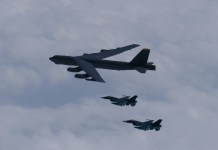China’s ties with the ASEAN or Association of Southeast Asian Nations over the South China Sea is at a critical stage. The ASEAN region is crucial to the Belt and Road Initiative (BRI) – the dream project of President Xi Jing Ping but ongoing disputes over the crucial South China Sea between US-backed ASEAN has only complicated the matter.
India, China Engaged In A ‘Ferocious Race’ To Help African Nations During COVID-19 Pandemic
ASEAN nations have often criticized aggressive Chinese activities and plans in the South China Sea (SCS) as Beijing attempts to strengthen its grip on the disputed territories.
As reported by EurAsian Times earlier, the South China Sea is a key naval passage linking Asia with Africa and Europe. As estimated $3.37 trillion of international trade passes through the SCS and it is believed to be abundant in untapped natural resources such as oil and gas.
China lays claims to 80% of the SCS. It is also claimed by Vietnam, Philippines, Indonesia, Malaysia and Brunei all of who form the part of the ASEAN nations. Other members of the ASEAN includes Cambodia, Laos, Myanmar, Singapore and Thailand.
ASEAN Nations vs China Over South China Sea
With the ASEAN countries busy dealing with the COVID-19 pandemic, China has taken advantage of the situation and has used this opportunity to forward its territorial claims in the South China Sea.
Last month, China established two districts to manage – the Spratly Islands and Paracel. According to reports, the two new districts will be under the authority of the local government in Sansha, a city in Hainan.
The new districts will govern the Paracel and Macclesfield Bank – an area claimed by Vietnam and Taiwan – and the Spratly Islands and their adjacent waters, where there are multiple overlapping claims from the Philippines, Malaysia and even Brunei.
India Rejects Dubious Chinese COVID-19 Testing Kits; Focuses On ‘Make In India’
Prior to this, the Chinese had named and effectively claimed 80 geographical features in the SCS. According to reports, this includes “25 islands, shoals and reefs, and 55 undersea mountains and ridges”. But the Chinese actions have not gone unnoticed and have drawn criticism and protests by most of ASEAN members including Vietnam, Philipines and Malaysia.
Chinese provocative actions drew immediate criticism from Vietnam. Vietnam currently occupies 13 of the reefs in the West. Vietnam’s Foreign Ministry spokesperson, Le Thi Thu Hang said that the move had “seriously violated” Vietnam’s sovereignty.
On April 2, a Vietnamese fishing vessel sunk after colliding with a Chinese coastguard ship near Parcel Islands. The sailors on board were rescued by the coast guard but the Chinese denied any wrongdoing.
Surprisingly, Vietnam got support from the Philippines, as they remembered the event in June 2019. In this incident,22 Filipino fishermen were left floating in the high seas when a Chinese vessel rammed and sank their boat at Reed Bank. Vietnam immediately came to the rescue saving the men adrift in the seas.
Vietnam also sent a diplomatic protest note to the UN over China’s illegal claims over the South China Sea. Le Thi Thu Hang emphasised that ‘Vietnam asserts its sovereignty over the Hoang Sa (Paracel) and Truong Sa (Spratly) archipelagos in the East Sea in accordance with international law’.
The Philippines, another ASEAN member, has seen massive investments from Beijing in the country but remains dissatisfied by the Chinese antics. The Philippines also opposed China’s establishment of two districts to govern Parcel and Spratly Islands.
Not Chinese Army But Beijing’s Investment Policy Biggest Threat To India
In the latter, China has turned seven reefs, including Fiery Cross, into missile-protected island bases, including three with runways. The Philippines has a presence on at least nine islands and islets in an area it claims in the Spratlys.
The Department of Foreign Affairs issued a statement objecting to what it called China’s “illegal designation” of Fiery Cross Reef as a regional administrative centre in the hotly contested Spratly archipelago.
“The Philippines calls on China to adhere to international law,” the department said, reminding Beijing of a 2002 agreement that urged all governments involved in the SCS dispute to exercise self-restraint abject from provocative actions that could threaten the stability of the region.
Malaysia, another ASEAN member, has been at the receiving end of Chinese intimidation. A Malaysian oil vessel was followed by a Chinese survey ship, Haiyang Dizhi.
The Malaysian coast guard confirmed that the survey activity was inside Malaysia’s exclusive economic zone. According to Haiyang Dizhi’s travel history, it left port at Sanya on Hainan Island on 9 April, went through Vietnamese waters and entered the waters of Malaysia and Brunei on 17 April.
US Support To ASEAN
The United States is also actively involved in the SCS dispute as it views Chinese actions as examples of expansionism and regional bullying. In addition to the air and naval exercise in response to Chinese activities, Washington also spoke to ASEAN member countries via video call earlier last week.
U.S. Secretary of State, Mike Pompeo, warned his ASEAN counterparts that China is taking advantage of the world’s preoccupation with the coronavirus. Since many member nations are weak to respond at this critical juncture, the Chinese have the perfect window of opportunity to swiftly assert their position.
South China Sea Awaits A Fearsome US-China Clash Ahead Of US Presidential Elections?
ASEAN countries cannot afford the colonization of the South China Sea by Beijing. Experts talking to the EurAsian Times stated that as long as ASEAN members continue to argue amongst themselves, China will find it easier to split them and reap in the rewards of a fractured association.
ASEAN must work with the US, who although is not a claimant in the South China Sea dispute, but remains the only country that can thwart Beijing’s actions and plans.
Despite the international outcry and criticism, China seems determined to push forward and defend its regional interests. China launched a counter-protest to Vietnam’s issuing of diplomatic notes to the UN, saying – “Any country that attempts to deny China’s sovereignty, rights and interests in the South China Sea in any form and to reinforce their illegal claims is doomed to fail,” said Geng Shuang, the Ministry spokesperson.
China will take “all necessary measures to firmly safeguard its sovereignty, rights and interests in the South China Sea,” the foreign ministry said in a statement.
However, experts have warned that ASEAN nations must unite and unequivocally back the US to contain China and at the same time seriously negotiate with Beijing to find a long-lasting solution. Else, the day the US starts slipping, China would have controlled the entire region, either by economic might or military muscle.





